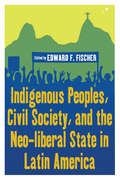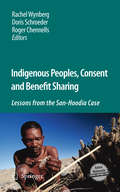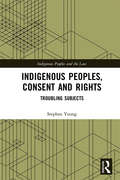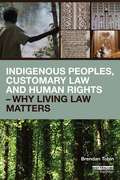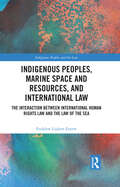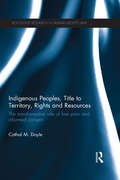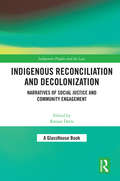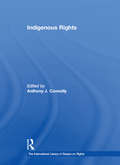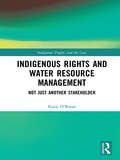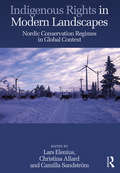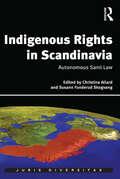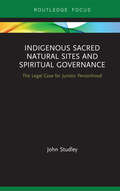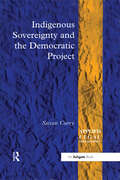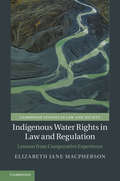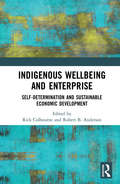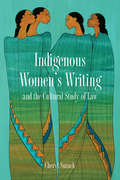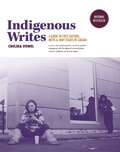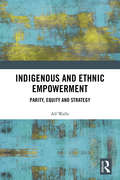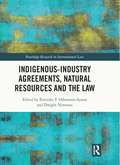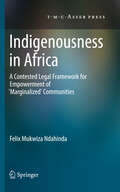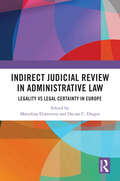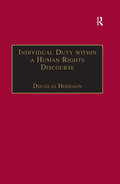- Table View
- List View
Indigenous Peoples, Civil Society, And The Neo-liberal State In Latin America
by Edward F. FischerIn recent years the concept and study of "civil society" has received a lot of attention from political scientists, economists, and sociologists, but less so from anthropologists. A ground-breaking ethnographic approach to civil society as it is formed in indigenous communities in Latin America, this volume explores the multiple potentialities of civil society's growth and critically assesses the potential for sustained change. Much recent literature has focused on the remarkable gains made by civil society and the chapters in this volume reinforce this trend while also showing the complexity of civil society - that civil society can itself sometimes be uncivil. In doing so, these insightful contributions speak not only to Latin American area studies but also to the changing shape of global systems of political economy in general.
Indigenous Peoples, Consent and Benefit Sharing: Lessons from the San-Hoodia Case
by Doris Schroeder Rachel Wynberg Roger ChennellsIndigenous Peoples, Consent and Benefit Sharing is the first in-depth account of the Hoodia bioprospecting case and use of San traditional knowledge, placing it in the global context of indigenous peoples' rights, consent and benefit-sharing. It is unique as the first interdisciplinary analysis of consent and benefit sharing in which philosophers apply their minds to questions of justice in the Convention on Biological Diversity (CBD), lawyers interrogate the use of intellectual property rights to protect traditional knowledge, environmental scientists analyse implications for national policies, anthropologists grapple with the commodification of knowledge and, uniquely, case experts from Asia, Australia and North America bring their collective expertise and experiences to bear on the San-Hoodia case.
Indigenous Peoples, Consent and Rights: Troubling Subjects (Indigenous Peoples and the Law)
by Stephen YoungAnalysing how Indigenous Peoples come to be identifiable as bearers of human rights, this book considers how individuals and communities claim the right of free, prior and informed consent (FPIC) as Indigenous peoples. The basic notion of FPIC is that states should seek Indigenous peoples’ consent before taking actions that will have an impact on them, their territories or their livelihoods. FPIC is an important development for Indigenous peoples, their advocates and supporters because one might assume that, where states recognize it, Indigenous peoples will have the ability to control how non-Indigenous laws and actions will affect them. But who exactly are the Indigenous peoples that are the subjects of this discourse? This book argues that the subject status of Indigenous peoples emerged out of international law in the late 1970s and early 1980s. Then, through a series of case studies, it considers how self-identifying Indigenous peoples, scholars, UN institutions and non-government organizations (NGOs) dispersed that subject-status and associated rights discourse through international and national legal contexts. It shows that those who claim international human rights as Indigenous peoples performatively become identifiable subjects of international law – but further demonstrates that this does not, however, provide them with control over, or emancipation from, a state-based legal system. Maintaining that the discourse on Indigenous peoples and international law itself needs to be theoretically and critically re-appraised, this book problematises the subject-status of those who claim Indigenous peoples’ rights and the role of scholars, institutions, NGOs and others in producing that subject-status. Squarely addressing the limitations of international human rights law, it nevertheless goes on to provide a conceptual framework for rethinking the promise and power of Indigenous peoples’ rights. Original and sophisticated, the book will appeal to scholars, activists and lawyers involved with indigenous rights, as well as those with more general interests in the operation of international law.
Indigenous Peoples, Customary Law and Human Rights - Why Living Law Matters: Why Living Law Matters (Routledge Studies in Law and Sustainable Development)
by Brendan TobinThis highly original work demonstrates the fundamental role of customary law for the realization of Indigenous peoples’ human rights and for sound national and international legal governance. The book reviews the legal status of customary law and its relationship with positive and natural law from the time of Plato up to the present. It examines its growing recognition in constitutional and international law and its dependence on and at times strained relationship with human rights law. The author analyzes the role of customary law in tribal, national and international governance of Indigenous peoples’ lands, resources and cultural heritage. He explores the challenges and opportunities for its recognition by courts and alternative dispute resolution mechanisms, including issues of proof of law and conflicts between customary practices and human rights. He throws light on the richness inherent in legal diversity and key principles of customary law and their influence in legal practice and on emerging notions of intercultural equity and justice. He concludes that Indigenous peoples’ rights to their customary legal regimes and states’ obligations to respect and recognize customary law, in order to secure their human rights, are principles of international customary law, and as such binding on all states. At a time when the self-determination, land, resources and cultural heritage of Indigenous peoples are increasingly under threat, this accessible book presents the key issues for both legal and non-legal scholars, practitioners, students of human rights and environmental justice, and Indigenous peoples themselves.
Indigenous Peoples, Marine Space and Resources, and International Law: The Interaction Between International Human Rights Law and the Law of the Sea (ISSN)
by Endalew Lijalem EnyewThis book addresses the rights of indigenous peoples to marine space and associated marine resources under international law.Examining the rights of indigenous peoples relating to marine space and marine resources both in international human rights law and the law of the sea, the book provides an in-depth critical analysis of the existing legal framework, whilst identifying the gaps, and possible further mechanisms, for recognizing the rights of indigenous peoples to marine space. The book addresses three main issues: 1) the extent to which international law recognizes and protects the rights of indigenous peoples in relation to marine space and marine resources; 2) if and how the law of the sea and international human rights law pertaining to the rights of indigenous peoples to marine space and marine resources interact; 3) whether and to what extent the law of the sea regime limits the capacity of coastal States to recognize and implement the rights of indigenous peoples relating to marine space and resources. In response, and in a context where indigenous marine rights are under increasing threat, the book develops an important critical theoretical and methodological approach which moves beyond the current doctrinal focus of much existing work in this area.The book will appeal to academics, researchers, and practitioners in the areas of indigenous peoples and the law, international law, the law of the sea, and human rights.
Indigenous Peoples, Title to Territory, Rights and Resources: The Transformative Role of Free Prior and Informed Consent (Routledge Research in Human Rights Law)
by Cathal M. DoyleThe right of indigenous peoples under international human rights law to give or withhold their Free Prior and Informed Consent (FPIC) to natural resource extraction in their territories is increasingly recognized by intergovernmental organizations, international bodies, and industry actors, as well as in the domestic law of some States. This book offers a comprehensive overview of the historical basis and status of the requirement for indigenous peoples’ consent under international law, examining its relationship with debates and practice pertaining to the acquisition of title to territory throughout the colonial era. Cathal Doyle examines the evolution of the contemporary concept of FPIC and the main challenges and debates associated with its recognition and implementation. Drawing on existing jurisprudence and evolving international standards, policies and practices, Doyle argues that FPIC constitutes an emerging norm of international law, which is derived from indigenous peoples’ self-determination, territorial and cultural rights, and is fundamental to their realization. This rights consistent version of FPIC guarantees that the responses to questions and challenges posed by the extractive industry’s increasingly pervasive reach will be provided by indigenous peoples themselves. The book will be of great interest and value to students and researchers of public international law, and indigenous peoples and human rights.
Indigenous Reconciliation and Decolonization: Narratives of Social Justice and Community Engagement (Indigenous Peoples and the Law)
by Ranjan DattaThis book addresses the ethical and practical issues at stake in the reconciliation of Indigenous and non-indigenous communities. An increasing number of researchers, educators, and social and environmental activists are eager to find ways to effectively support ongoing attempts to recognize, integrate and promote Indigenous perspectives and communities. Taking Canada as its focus, this book offers a multidisciplinary consideration of a range of reconciliation policies, practices and initiatives that are relevant in all settler states. Set against its increasing neoliberal appropriation, the book resituates reconciliation in the everyday contexts of community interaction and engagement, as well as in the important areas of Indigenous knowledge, resource management and social and environmental justice. Reconciliation is not just the responsibility of law and government. And, attuned to the different perspectives of settlers, migrants and refugee communities, the book examines areas of opportunity, as well as obstacles to progress, in the forging of a truly decolonizing framework for reconciliation. As the challenges of reconciliation cross numerous academic and substantial areas, this book will appeal to a range of scholars and practitioners working in law, politics, education, environmental studies, anthropology and Indigenous studies.
Indigenous Rights (The International Library of Essays on Rights)
by Anthony J. ConnollyThroughout the world, indigenous rights have become increasingly prominent and controversial. The recent adoption by the United Nations General Assembly of the Declaration on the Rights of Indigenous Peoples is the latest in a series of significant developments in the recognition of such rights across a range of jurisdictions. The papers in this collection address the most important philosophical and practical issues informing the discussion of indigenous rights over the past decade or so, at both the international and national levels. Its contributing authors comprise some of the most interesting and influential indigenous and non-indigenous thinkers presently writing on the topic.
Indigenous Rights and Water Resource Management: Not Just Another Stakeholder (Indigenous Peoples and the Law)
by Katie O'BryanIn an era of climate change, the need to manage our water resources effectively for future generations has become an increasingly significant challenge. Indigenous management practices have been successfully used to manage inland water systems around the world for thousands of years, and Indigenous people have been calling for a greater role in the management of water resources. As First Peoples and as holders of important knowledge of sustainable water management practices, they regard themselves as custodians and rights holders, deserving of a meaningful role in decision-making. This book argues that a key (albeit not the only) means of ensuring appropriate participation in decision-making about water management is for such participation to be legislatively mandated. To this end, the book draws on case studies in Australia and New Zealand in order to elaborate the legislative tools necessary to ensure Indigenous participation, consultation and representation in the water management landscape.
Indigenous Rights in Modern Landscapes: Nordic Conservation Regimes in Global Context
by Lars Elenius Christina Allard Camilla SandströmThis book examines the diverse use of Indigenous customary rights in modern landscapes from a multidisciplinary perspective. Divided into two parts, the first deals explicitly with Sámi customary rights in relation to nature conservation in the Nordic countries and Russia from a legal and historical perspective. The authors investigate how longstanding Sámi customary territorial rights have been reassessed in the context of new kinds of legislation regarding Indigenous people. They also look at the ideas behind the historical models of nature conservation. The second part deals with the ideas and implementation of new kinds of postcolonial models of nature conservation. The case of the Sámi is compared with other Indigenous people internationally with cases from Australia, New Zealand, Canada and India. The work investigates how the governance of protected areas has been influenced by the principles of equality and positive discrimination, and how it has affected the possibilities of establishing adaptive co-management arrangements for specific areas. How the legal situation of Indigenous peoples has been recognised in an international context is also investigated. The volume provides a multidisciplinary analysis of how the customary livelihood of Indigenous people has adapted to modern industrialised landscapes and also how postcolonial approaches have contributed to global changes of Indigenous rights and nature conservation models.
Indigenous Rights in Scandinavia: Autonomous Sami Law (Juris Diversitas)
by Christina Allard Susann Funderud SkogvangThis book contributes to the international debate on Indigenous Peoples Law, containing both in-depth research of Scandinavian historical and legal contexts with respect to the Sami and demonstrating current stances in Sami Law research. In addition to chapters by well-known Scandinavian experts, the collection also comments on the legal situation in Norway, Sweden and Finland in relation to other jurisdictions and indigenous peoples, in particular with experiences and developments in Canada and New Zealand. The book displays the current research frontier among the Scandinavian countries, what the present-day issues are and how the nation states have responded so far to claims of Sami rights. The study sheds light on the contrasts between the three countries on the one hand, and between Scandinavia, Canada and New Zealand on the other, showing that although there are obvious differences, for instance related to colonisation and present legal solutions, there are also shared experiences among the indigenous peoples and the States. Filling a gap in an under-researched area of Sami rights, this book will be a valuable resource for academics, researchers and policy-makers with an interest in Indigenous Peoples Law and comparative research.
Indigenous Rights in the Age of the Un Declaration
by Elvira Pulitano Mililani B. TraskThis examination of the role played by the United Nations Declaration on the Rights of Indigenous Peoples (UNDRIP) in advancing indigenous peoples' self-determination comes at a time when the quintessential Eurocentric nature of international law has been significantly challenged by the increasing participation of indigenous peoples on the international legal scene. Even though the language of human rights discourse has historically contributed to delegitimise indigenous peoples' rights to their lands and cultures, this same language is now upheld by indigenous peoples in their ongoing struggles against the assimilation and eradication of their cultures. By demanding that the human rights and freedoms contained in various UN human rights instruments be now extended to indigenous peoples and communities, indigenous peoples are playing a key role in making international law more 'humanising' and less subject to State priorities.
Indigenous Sacred Natural Sites and Spiritual Governance: The Legal Case for Juristic Personhood (Routledge Focus on Environment and Sustainability)
by John StudleySince time immemorial indigenous people have engaged in legal relationships with other-than-human-persons. These relationships are exemplified in enspirited sacred natural sites, which are owned and governed by numina spirits that can potentially place legal demands on humankind in return for protection and blessing. Although conservationists recognise the biodiverse significance of most sacred natural sites, the role of spiritual agency by other-than-human-persons is not well understood. Consequently, sacred natural sites typically lack legal status and IUCN-designated protection. More recent ecocentric and posthuman worldviews and polycentric legal frameworks have allowed courts and legislatures to grant 'rights' to nature and 'juristic personhood' and standing to biophysical entities. This book examines the indigenous literature and recent legal cases as a pretext for granting juristic personhood to enspirited sacred natural sites. The author draws on two decades of his research among Tibetans in Kham (southwest China), to provide a detailed case study. It is argued that juristic personhood is contingent upon the presence and agency of a resident numina and that recognition should be given to their role in spiritual governance over their jurisdiction. The book concludes by recommending that advocacy organisations help indigenous people with test cases to secure standing for threatened sacred natural sites (SNS) and calls upon IUCN, UNESCO (MAB and WHS), ASEAN Heritage and EuroNatura to retrospectively re-designate their properties, reserves, parks and initiatives so that SNS and spiritual governance are fully recognised and embraced. It will be of great interest to advanced students and researchers in environmental law, nature conservation, religion and anthropology.
Indigenous Sovereignty and the Democratic Project (Applied Legal Philosophy)
by Steven CurryLiberal democracies are predicated on popular sovereignty - the ideal of government for and by the People. Throughout the developed world indigenous peoples continue to deny legitimacy to otherwise popular governments because their consent has never been sought. Using examples from Australia, New Zealand, Canada and the USA, this book tackles the problem of democratic legitimation from the perspective of indigenous peoples, arguing that having suffered conquest, these people cannot be said to consent until conditions for their consent have been realised. These conditions include constitutional change that recognizes indigenous law as the 'law of the land' - a radical proposal going far beyond the current limits of self-determination.
Indigenous Water Rights in Law and Regulation: Lessons from Comparative Experience (Cambridge Studies in Law and Society)
by Elizabeth Jane MacphersonIndigenous Water Rights in Law and Regulation responds to an unresolved question in legal scholarship: how are (or how might be) indigenous peoples' rights included in contemporary regulatory regimes for water. This book considers that question in the context of two key trajectories of comparative water law and policy. First, the tendency to 'commoditise' the natural environment and use private property rights and market mechanisms in water regulation. Second, the tendency of domestic and international courts and legislatures to devise new legal mechanisms for the management and governance of water resources, in particular 'legal person' models. This book adopts a comparative research method to explore opportunities for accommodating indigenous peoples' rights in contemporary water regulation, with country studies in Australia, Aotearoa New Zealand, Chile and Colombia, providing much needed attention to the role of rights and regulation in determining indigenous access to, and involvement with, water in comparative law.
Indigenous Wellbeing and Enterprise: Self-Determination and Sustainable Economic Development
by Robert B. AndersonIn this book, we explore the economic wellbeing of Indigenous peoples globally through case studies that provide practical examples of how Indigenous wellbeing is premised on sustainable self- determination that is in turn dependent on a community’s evolving model for economic development, its cultural traditions, its relationship to its traditional territories and its particular spiritual practices. Adding to the richness, geographically these chapters cover North, Central and South America, Northern Europe, the Circumpolar Arctic, Southern Europe, the Middle East, Asia and Oceania and a resulting diverse set of Indigenous peoples. The book addresses key issues related to economic, environmental, social and cultural value creation activities and provides numerous examples and case studies of Indigenous communities globally which have successfully used entrepreneurship in the pursuit of sustainable development and wellbeing. Readers will gain practical understandings of the nature of sustainable economic development from a cross- section of case studies of Indigenous perspectives globally. The chapters map out the international development of Indigenous rights and the influence that this has had on Indigenous communities globally in asserting their sovereignty and acting on their rights to develop sustainable governance and economic development practices. Readers will develop insights into the intersection of Indigenous governance with sustainable practice and community wellbeing through practical case studies that explain the need for Indigenous- led economic development and governance strategies, which are responsive to local, regional, national and international realities in developing sustainable Indigenous economies focused on economic, environmental, social and cultural value creation. This book will be useful for Indigenous and non- Indigenous business students studying undergraduate business or MBA programs who seek to understand the global context and the varied experiences of Indigenous peoples in developing sustainable economic development strategies that promote community wellbeing.
Indigenous Women's Writing and the Cultural Study of Law
by Cheryl SuzackIn Indigenous Women’s Writing and the Cultural Study of Law, Cheryl Suzack explores Indigenous women’s writing in the post-civil rights period through close-reading analysis of major texts by Leslie Marmon Silko, Beatrice Culleton Mosionier, Louise Erdrich, and Winona LaDuke. Working within a transnational framework that compares multiple tribal national contexts and U.S.-Canadian settler colonialism, Suzack sheds light on how these Indigenous writers use storytelling to engage in social justice activism by contesting discriminatory tribal membership codes, critiquing the dispossession of Indigenous women from their children, challenging dehumanizing blood quantum codes, and protesting colonial forms of land dispossession. Each chapter in this volume aligns a court case with a literary text to show how literature contributes to self-determination struggles. Situated at the intersections of critical race, Indigenous feminist, and social justice theories, Indigenous Women’s Writing and the Cultural Study of Law crafts an Indigenous-feminist literary model in order to demonstrate how Indigenous women respond to the narrow vision of law by recuperating other relationships–to themselves, the land, the community, and the settler-nation.
Indigenous Writes: A Guide to First Nations, Métis, & Inuit Issues in Canada
by Chelsea VowelDelgamuukw. Sixties Scoop. Bill C-31. Blood quantum. Appropriation. Two-Spirit. Tsilhqot&’in. Status. TRC. RCAP. FNPOA. Pass and permit. Numbered Treaties. Terra nullius. The Great Peace… Are you familiar with the terms listed above? In Indigenous Writes, Chelsea Vowel, legal scholar, teacher, and intellectual, opens an important dialogue about these (and more) concepts and the wider social beliefs associated with the relationship between Indigenous Peoples and Canada. In 31 essays, Chelsea explores the Indigenous experience from the time of contact to the present, through five categories—Terminology of Relationships; Culture and Identity; Myth-Busting; State Violence; and Land, Learning, Law, and Treaties. She answers the questions that many people have on these topics to spark further conversations at home, in the classroom, and in the larger community. Indigenous Writes is one title in The Debwe Series.
Indigenous Writes: A Guide to First Nations, Métis, & Inuit Issues in Canada
by Chelsea VowelDelgamuukw. Sixties Scoop. Bill C-31. Blood quantum. Appropriation. Two-Spirit. Tsilhqot&’in. Status. TRC. RCAP. FNPOA. Pass and permit. Numbered Treaties. Terra nullius. The Great Peace… Are you familiar with the terms listed above? In Indigenous Writes, Chelsea Vowel, legal scholar, teacher, and intellectual, opens an important dialogue about these (and more) concepts and the wider social beliefs associated with the relationship between Indigenous Peoples and Canada. In 31 essays, Chelsea explores the Indigenous experience from the time of contact to the present, through five categories—Terminology of Relationships; Culture and Identity; Myth-Busting; State Violence; and Land, Learning, Law, and Treaties. She answers the questions that many people have on these topics to spark further conversations at home, in the classroom, and in the larger community. Indigenous Writes is one title in The Debwe Series.
Indigenous Writes: A Guide to First Nations, Métis, & Inuit Issues in Canada
by Chelsea VowelDelgamuukw. Sixties Scoop. Bill C-31. Blood quantum. Appropriation. Two-Spirit. Tsilhqot’in. Status. TRC. RCAP. FNPOA. Pass and permit. Numbered Treaties. Terra nullius. The Great Peace… Are you familiar with the terms listed above? In Indigenous Writes, Chelsea Vowel, legal scholar, teacher, and intellectual, opens an important dialogue about these (and more) concepts and the wider social beliefs associated with the relationship between Indigenous Peoples and Canada. In 31 essays, Chelsea explores the Indigenous experience from the time of contact to the present, through five categories—Terminology of Relationships; Culture and Identity; Myth-Busting; State Violence; and Land, Learning, Law, and Treaties. She answers the questions that many people have on these topics to spark further conversations at home, in the classroom, and in the larger community. Indigenous Writes is one title in The Debwe Series.
Indigenous and Ethnic Empowerment: Parity, Equity and Strategy
by Alf H. WalleIndigenous, ethnic and rural peoples throughout the world struggle to effectively deal with the challenges triggered by outside economic and social intervention. This book presents business methods in a manner that reflects the needs, desires and priorities of indigenous peoples and provides the tools communities need to envision and deal with the full impact of social and economic intervention. In particular, the book helps local leaders and their advocates to better understand the full implications of the choices before them and develop skills to articulate and deal with local goals, needs, and priorities. The book is distinctive because it helps people embrace opportunities and change on their own terms. As a result, leaders and their advocates will be better able to evaluate and respond to opportunities in an informed and systematic manner. Various business disciplines (such as accounting, finance, human resource management, organizational theory, and marketing) are discussed in ways that help the reader to envision both mainstream perspectives and the distinctive issues faced by ethnic enclaves.
Indigenous-Industry Agreements, Natural Resources and the Law (Routledge Research in International Law)
by Dwight Newman Ibironke T. Odumosu-AyanuThis edited collection is an interdisciplinary and international collaborative book that critically investigates the growing phenomenon of Indigenous-industry agreements – agreements that are formed between Indigenous peoples and companies involved in the extractive natural resource industry. These agreements are growing in number and relevance, but there has yet to be a systematic study of their formation and implementation. This groundbreaking collection is situated within frameworks that critically analyze and navigate relationships between Indigenous peoples and the extraction of natural resources. These relationships generate important questions in the context of Indigenous-industry agreements in diverse resource-rich countries including Australia and Canada, and regions such as Africa and Latin America. Beyond domestic legal and political contexts, the collection also interprets, navigates, and deploys international instruments such as the United Nations Declaration on the Rights of Indigenous Peoples in order to fully comprehend the diverse expressions of Indigenous-industry agreements. Indigenous-Industry Agreements, Natural Resources and the Law presents chapters that comprehensively review agreements between Indigenous peoples and extractive companies. It situates these agreements within the broader framework of domestic and international law and politics, which define and are defined by the relationships between Indigenous peoples, extractive companies, governments, and other actors. The book presents the latest state of knowledge and insights on the subject and will be of value to researchers, academics, practitioners, Indigenous communities, policymakers, and students interested in extractive industries, public international law, Indigenous rights, contracts, natural resources law, and environmental law.
Indigenousness in Africa
by Felix Mukwiza NdahindaFollowing the internationalisation of the indigenous rights movement, a growing number of African hunter-gatherers, pastoralists and other communities have adopted indigenousness in claiming special legal protection. Their legal claims as the indigenous peoples of Africa are backed by many international actors such as indigenous rights activists, donors and scholars. However, indigenous identification is resisted by many African governments, some community members and some anthropologists. Felix Mukwiza Ndahinda explores the sources of indigenous identification in Africa and its legal and political implications. Noting the limitations of systematic and discursive, as opposed to activist, studies, it questions the appropriateness of this framework in efforts aimed at empowering claimant communities in inherently multiethnic African countries and adopts an interdisciplinary approach in order to capture the indigenous rights phenomenon in Africa.
Indirect Judicial Review in Administrative Law: Legality vs Legal Certainty in Europe
by Mariolina Eliantonio and Dacian C. DragosThis book provides a comparative analysis of the concept and concrete application of the system of indirect review of administrative action. The indirect review of administrative action is a judicial review mechanism that permits re-visiting already settled administrative measures. As an indirect way of challenging the validity of a measure or act by attacking the legal basis on which it is founded, it can regard either general acts or individual acts and measures. This book explores whether the system of indirect review is a suitable remedy for modern administrative justice, assessing whether it fairly balances the legality and the legal certainty principles. It examines the tension between the two principles and seeks to establish what the standards of review are and whether a common European trend can be discerned by analysing the theory and practice from jurisdictions in Western and Eastern Europe, as well as the EU legal system. The book will be a valuable resource for academics, researchers and policy-makers working in the areas of Administrative Law, EU law, and Public Administration.
Individual Duty within a Human Rights Discourse (Applied Legal Philosophy)
by Douglas HodgsonOver the past two decades or so, legal literature has devoted much attention to various human rights issues at both the national and international levels. Yet there has been comparatively little written on the concept and importance of individual duty within the human rights discourse. This book attempts to comprehensively and systematically examine the corollary of human right - the principle of individual duty - from a number of different perspectives, including history, the law (principally international human rights and humanitarian law and national constitutional law), philosophy, jurisprudence, religion, and ethics. The author attempts to demonstrate that a greater emphasis upon individual duties is consistent with a cultural relativist critique, natural law theory, the experience of national legal systems and regional human rights systems, certain socio-political philosophies and conventional sociological postulates, and the dictates of good public policy. The author urges the assignment of a greater, indeed revived, role for the principle of individual duty in order to achieve a more salutary balance between rights and duties and in the relationship between individual freedom and the welfare of the general community.
